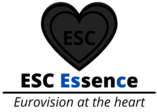Personally, I’ve never seen too much significance in the Eurovision slogan. Sure, it adds a nice talking point for the pre-season but how much it actually impacts my sentiments towards a contest, well I’m not convinced it really does. After all, Moscow 2009 completely jumped off the bandwagon and had no slogan and its still remembered very fondly to this day. Of course, one can argue having no slogan in a sample of many slogans is just as if not more impactful but when it comes to the branding of contests, images and logos mean more to me than a collection of words ever will.
When I think of 2013 I think of butterflies before my brain rummages through its filing cabinets to pull out We Are One and this only happens after my brain has successfully eliminated Building Bridges as a potential answer. Maybe I have watched one too many Scandi crime drama that my mind automatically puts these two together or maybe the stage and branding of the show (featuring the iconic bridge to Copenhagen) plays a part in tricking my mind but Eurovision slogans could often be switched around to a different edition and I probably wouldn’t have thought any differently about the branding. Whilst he images live on in my minds – having hopped their way onto everything from CD covers to trains, T-shirts to billboards, the slogans are less impactful to me.
So do we even need them?
I mean sure we all get the odd giggle about deciding to Open Up and Come Together, to experience our Awakening – a True Fantasy am I right? But there is more purpose to the European Broadcasting Union (EBU) creating a brand for each edition than just our casual amusement. And yet, If Russia could get away with simply branding their show with an abstract interpretation of ‘a bird’ – then what does a slogan bring to the contest? Well, if the images and logos can be so powerful as to be recalled in an instant, an effective slogan would tie into that and mirror the identity of the logo. Essentially adding meaning and significance to that quickly recalled image in ways that maybe a picture or the words alone could simply not portray so easily.
For this reason, Kiev’s 2017 artwork is pretty effective with its slogan Celebrate Diversity, as each bead is unique but needed to create the true beauty of the Namysto necklace. It is therefore a pity I remember the slogan more so for the hosts all being straight white men (and maybe not quite as diverse haha) than for this logo. When it comes to this sort of aspect of branding it is recalled and is important to get right then and 2017 was nearly spot-on for me but just didn’t embrace the branding to its fullest and truest sense to really send home that message of Celebrat(ing) Diversity. I’d argue another particularly successful slogan was A Modern Fairytale due to the postcards containing interpretations of fairytales and tying in the idea of this edition being a fairytale (even before Alexander Rybak would walk the Eurovision stage). For all Eurovision 2002’s dated looking production these days, I always remember the contest for the way they managed to tie a consistent branding and package together.
But the slogan hasn’t even been picked yet – isn’t this random timing?
Well after having Open Up be the slogan for effectively two years straight and all that exists to differentiate between the contests is a logo variation (and thankfully not a seemingly completely unrelated picture), I’m hoping that 2022 has even more synthesis between the branding and the contest. You don’t need a slogan per say, you don’t need fancy postcards. You don’t need beautiful artwork, the most thoughtful stage design or lead-up hyping the branding…
BUT, you do need a consistency and flow to the branding (in as many components as possible) to create a memorable and instantly recallable theme for that ultimate distinctive quality between contests.
In many ways the songs often can and do create the atmosphere of the contest all by themselves but in saying that if the EBU get a theme just right – it would certainly tempt me to buy more merchandise!
A bit of a different article today, I hope you still enjoyed it. Do you have a favourite contest and was that at all influenced by the branding. Do you think it was better in ‘the good old days’ before Eurovision bothered with slogans? I’m always open to a discussion both here in the comments and via our socials – so please don’t hesitate to contact me! Have a great day.
